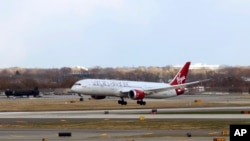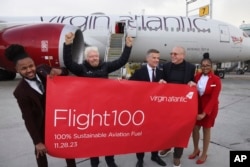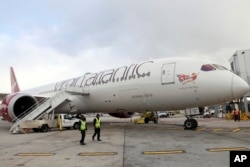British Businessman Richard Branson and Britain’s Department of Transport organized a flight crossing the Atlantic Ocean by a jet using fuel made from animal fat.
The Boeing 787 passenger airplane flew from London to New York on Tuesday using what the organizers called sustainable jet fuel.
Branson founded Virgin Atlantic airlines. The airline said it used a fuel made from waste fats, including animal fat used in cooking. The transport department spent over $1.2 million for the flight.
Branson was on the plane, along with reporters, engineers and government officials as it crossed the Atlantic Ocean. There were no paying passengers.
“The world will always assume something can’t be done, until you do it,” Branson said.
The transport department called the trip “a huge step towards jet zero.” “Jet zero” is a play on words. It means the trip did not use traditional jet fuel that comes from oil. Some officials in the international air travel industry say they hope their companies can reach what is called “net zero” by 2050. “Net zero” is a proposed balance between the release of carbon gases into the atmosphere and the capture of those gases.
However, organizers admit the mix of fuel used on Tuesday’s trip will not be widely available anytime soon.
The U.S. Department of Energy says sustainable aviation fuel is the best way to reach the “net zero” target by 2050. The government says sustainable aviation fuel cuts the release of greenhouse gases, gases said to cause warming, by 70 percent. However, the Department of Energy said the 2050 goal is “aspirational.” That means it is unlikely to be reached.
In the U.S., sustainable jet fuel production increased from about 8 million liters in 2016 to about 60 million liters in 2022. But that is only about 0.1 percent of the fuel used by major airlines. In 2018, the Federal Aviation Administration set a goal of producing about 15 billion liters per year.
President Joe Biden’s administration said in 2021 that it wanted three times that amount by 2030 and for commercial airlines to fly on 100 percent sustainable fuel by 2050. In Britain, the goal is for 10 percent of jet fuel to come from what it calls sustainable sources by 2030.
Holly Boyd-Boland is an official with Virgin Atlantic. She said Tuesday’s flight shows a sustainable flight is possible, but the difficulty is in producing enough of the new fuel “so that we’re flying more sustainable aviation fuel every day.”
Cait Hewitt is the policy director for the British non-profit group Aviation Environment Federation. The group is interested in reducing the effect of the aviation industry on the environment.
She said, “the idea that this flight somehow gets us closer to guilt-free flying is a joke.” She said it will be difficult to increase production of sustainable jet fuel to the point that it makes a difference.
I’m Dan Friedell.
Dan Friedell adapted this story for Learning English based on a report by the Associated Press.
____________________________________________________
Words in This Story
sustainable –adj. related to ideas about using resources without using them up completely
assume –v. to think something is true without knowing that it is true
aviation –n. things related to flight and aircraft
guilt –n. a feeling of shame over something you do or have done
We want to hear from you. Do you think you will ever be on a flight that it “jet zero?”








Forum